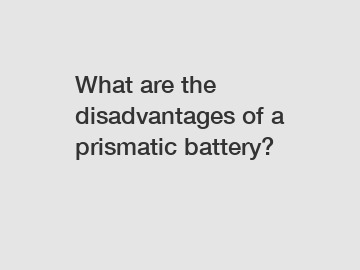What are the disadvantages of a prismatic battery?
What are the disadvantages of a prismatic battery?
Prismatic batteries have become increasingly popular in several applications due to their unique design and advantages. However, like any other technology, prismatic batteries also come with their fair share of disadvantages. In this article, we will delve into the drawbacks of prismatic batteries and explore how they impact their overall performance and applications.
1. Limited Flexibility in Shape and Size:

One of the major disadvantages of prismatic batteries is their limited flexibility in terms of shape and size. Unlike cylindrical or pouch batteries, prismatic batteries have a fixed rectangular shape, which makes it challenging to fit them into certain devices or tight spaces. This limitation restricts their usability in various applications and can lead to design constraints for manufacturers.
2. Higher Cost:
Prismatic batteries are generally more expensive to produce compared to other types of lithium-ion batteries. The manufacturing process for prismatic cells is complex and requires specialized equipment. Additionally, the raw materials used in prismatic batteries, such as lithium cobalt oxide, contribute significantly to the overall cost. The higher production cost of prismatic batteries can limit their adoption, particularly in applications with strict budget constraints.
3. Lower Energy Density:
Compared to cylindrical batteries, prismatic batteries generally have a lower energy density. Energy density refers to the amount of energy that can be stored in a given volume or mass. Due to their rectangular shape, prismatic batteries have a larger packaging overhead, meaning a larger portion of the overall size is dedicated to non-active components. This reduced energy density affects the battery's overall capacity and could be a drawback for applications requiring higher power output or longer runtime.
4. Heat Dissipation Challenges:
Another drawback of prismatic batteries is related to heat dissipation. Prismatic batteries tend to have lower heat dissipation capabilities due to their rigid structure and limited surface area. The absence of natural airflow between cylindrical cells, as found in some other types of batteries, can lead to the accumulation of heat, potentially resulting in thermal runaway and reduced lifespan. This makes prismatic batteries less suitable for high-power applications that generate excessive heat, such as electric vehicles.
In conclusion, while prismatic batteries offer unique advantages, they also present several disadvantages that must be considered when choosing a battery technology. Their limited flexibility in shape and size, higher production cost, lower energy density, and heat dissipation challenges pose significant limitations in certain applications. However, it's worth noting that continual research and development in the field of battery technology may address these drawbacks in the future, paving the way for more efficient and versatile prismatic batteries.
Contact us to discuss your requirements of lithium iron phosphate battery china, forklift battery 48v, lithium ion prismatic. Our experienced sales team can help you identify the options that best suit your needs.

Comments
0